This guide will walk you through the top 9 email API services for 2025.
Review the top nine choices, and find out which platform you should choose to meet your present and future email marketing needs.
What is an email API service?
An email API (Application Programming Interface) service lets you integrate email functionality into applications. It enables programmatic email management for various functions, such as sending, receiving, tracking, and analyzing emails.
But why is API such a game-changer for email marketing?
First, it allows you to automate your entire email flow—from sending order confirmations to scheduling newsletters—without manual input.
Imagine your email campaigns running seamlessly in the background while you focus on strategy.
And it’s not just about automation.
Email APIs can track crucial metrics, like open rates and bounce rates, and provide you with insights to improve your messaging.
Moreover, many APIs also offer personalization options, so your emails are tailored to each recipient.
The benefits of email API service for developers and businesses

The advantages go beyond making basic email functionality great again.
Check out the details below.
Ease of integration
Email APIs are easy to integrate within any app and platform. You can send emails right from your place with a few lines of code and a few minutes. There’s no need to build email servers from scratch.
You can use ready-to-go, official libraries in popular programming languages like PHP and Java. With them, you will set up email functionality quickly.
Automation
You can automate transactional emails, such as password resets or confirmation emails, so users receive the information they need immediately.
Some advanced APIs even support automated queue handling for high-traffic email campaigns. As a result, you will save time and resources.
Scalability
Email API services are designed to grow with you, whether you send a few thousand or several million emails per month.
They pack many features that automate tasks, allow you to add dedicated IP addresses, guarantee better sender reputation management, and ultimately grow your business.
Customization
Email APIs offer attractive customization options so your messages can be tailored to each recipient.
Using features like dynamic email templates, you can adjust your email program’s content, images, and layout based on user data and behavior.
Reliability
API services help increase reliability and achieve optimal inbox placement. Options like analytics, advanced sender authentication protocols, testing inbox placement and set-up, monitoring deliverability, etc., make this possible.
Tracking and analytics
Email APIs excel at tracking performance by providing real-time notifications and email analytics. The insights and data gained help marketers refine their strategies.
Some APIs also include advanced reporting tools to monitor user engagement over time, allowing your team to benefit from and make data-driven decisions.
Security
For any business handling user information, security features in email APIs are fundamental. Most services allow for integrating dedicated fraud prevention tools and extra security measures.
Some platforms have encryption and event webhook security to protect sensitive data during email transactions.
The top email API services to try in 2025
Take a moment and check out our list of top email API services to try in 2024 and beyond.
Bouncer
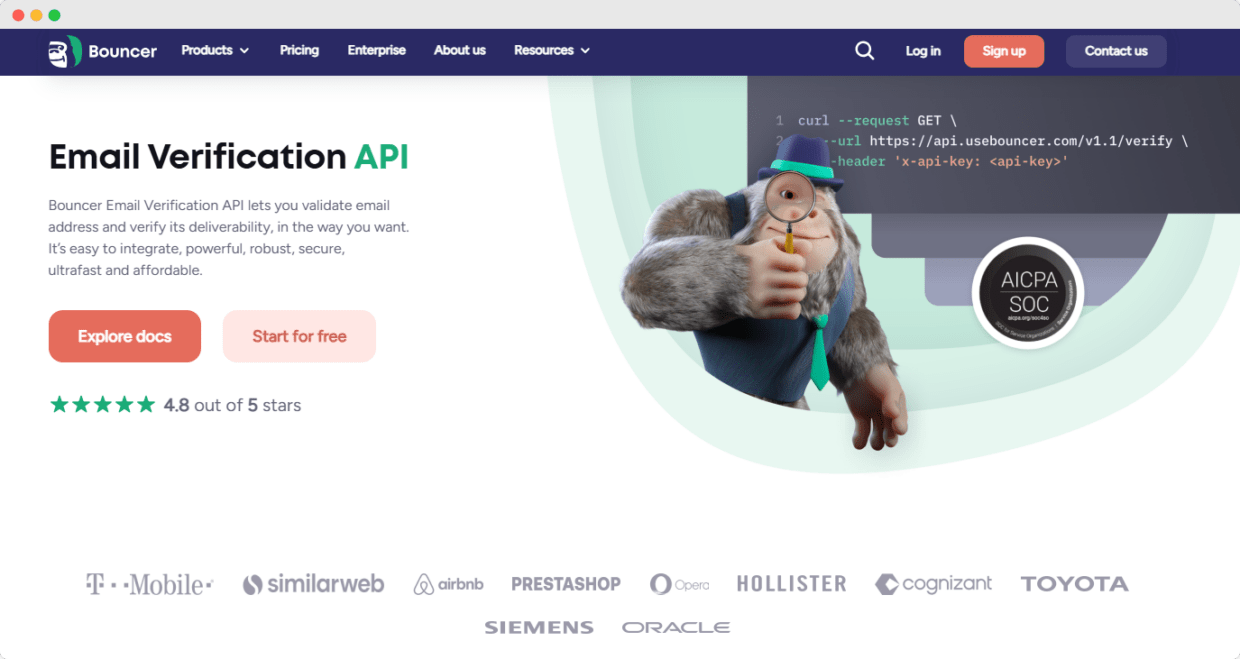
Bouncer is a high-performance email service provider. It offers robust features and focuses on accuracy, data protection, and premium support.
This email delivery platform helps businesses maintain clean, effective contact lists that maximize message reach and engagement.
Along with its verification API service, it boosts email marketing ROI and lets you perform faster and better.
Among the various email verification tools, Bouncer handles complex email configurations like catch-all addresses and anti-spam-protected accounts, which ensures better marketing campaigns.
Its power, scalability, and dedicated support team make it an essential tool for businesses looking to elevate their email communications strategy.
The most interesting features
- Fast and precise, the Bouncer API is high-speed and secure. It accommodates both synchronous and asynchronous needs for precision email verification.
- Real-time and batch verification. It offers real-time API endpoints to verify up to 500,000 email addresses instantly.
- Seamless integrations. Compatible with various marketing platforms, Bouncer can connect and sync with your already-used tools.
- Scalability. Bouncer API’s scalable and reliable infrastructure allows you to grow with market needs. It will adapt to your requirements and improve your email delivery service.
- Security and compliance. The tool delivers top-level security for sensitive email data with GDPR compliance, multi-factor authentication, and optional data processing limits.
- Email authentication. This platform includes an automatic setup for SPF, DKIM, and DMARC records to guarantee that emails are verified for higher deliverability rates.
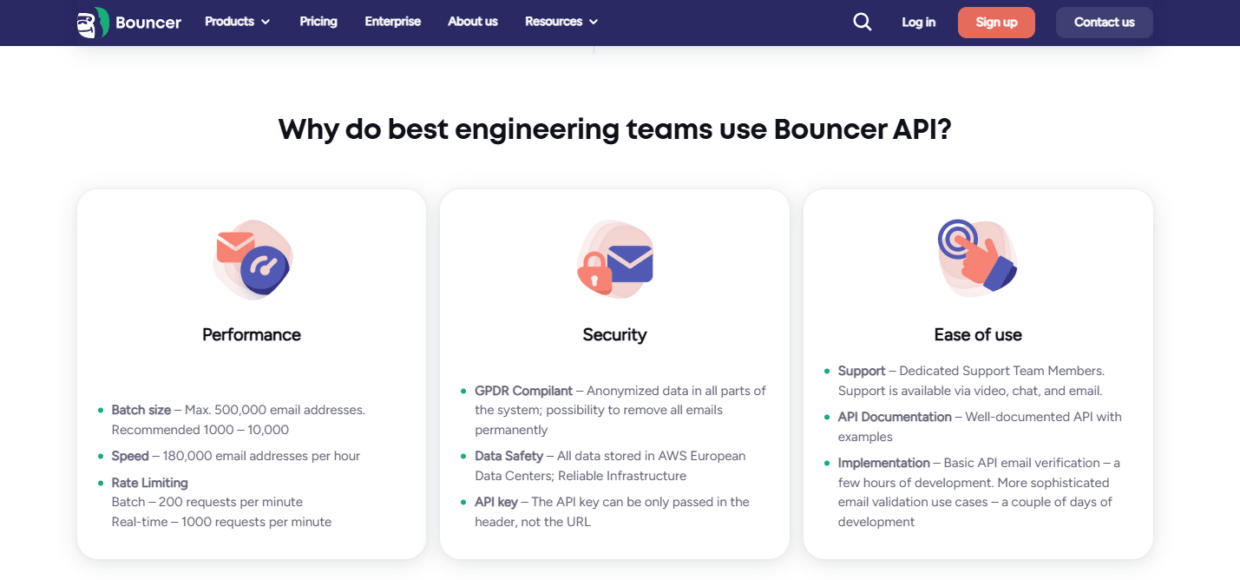
However, you will find much more in Bouncer than email API.
Bouncer Shield safeguards email sign-up forms, detects malicious email addresses, and blocks unwanted entries based on email and IP checks without coding.
Toxicity check identifies emails from known complainers, spam traps, or compromised sources, and rates them on a toxicity scale.
The deliverability kit tests inbox placement, verifies authentication and monitors blocklists for optimal sender performance. The data enrichment feature enhances email lists by adding publicly available company information for more targeted email campaigns.
Costs
Bouncer offers flexible pricing with both pay-as-you-go and subscription options.
10,000 email verification credits cost around $60 without expiration in pay-as-you-go rates. A monthly plan costs $48 for 10,000 credits for more regular needs, so yes – it’s cheaper.
This platform accepts multiple currencies and does not require a credit card.
The pricing is accessible for any business.
User reviews
Based on G2 reviews, users appreciate Bouncer’s ease of use and reliability.
Anna P. calls it a „must-have tool“ for its intuitive, user-friendly design and efficient email verification process.
Similarly, Gladys Ann N. praises Bouncer as a „game changer,“ noting its effectiveness in handling undeliverable emails and boosting productivity.
Across reviews, Bouncer’s dependable support and simplicity are highlighted as key strengths, especially valuable for those who rely on clean, responsive email lists.
Twilio SendGrid
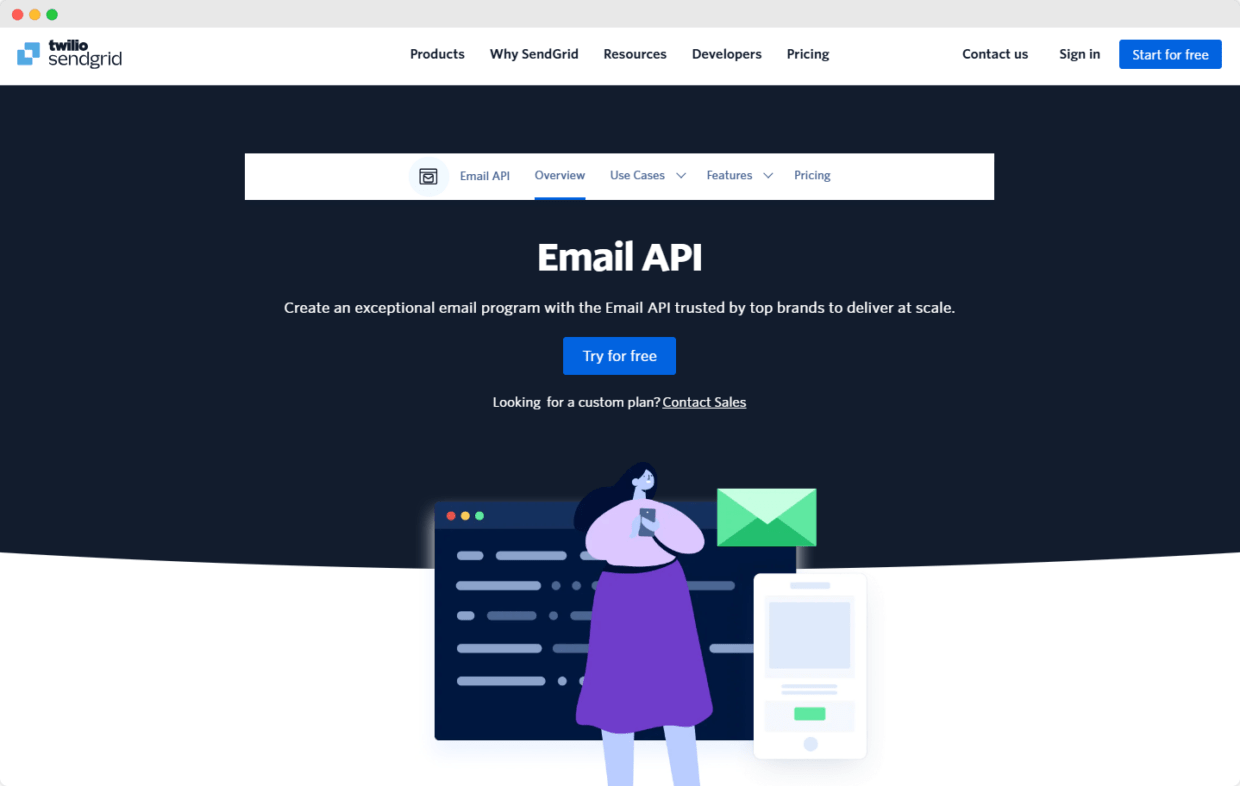
Twilio SendGrid offers a cloud-based email API service for businesses that want a reliable, scalable way to send emails quickly.
Their API services automate email delivery, handle high-volume email operations without needing your infrastructure, and streamline messaging services, like transactional email sending.
The most interesting features
- Sender authentication. Twilio SendGrid includes SPF records, custom DKIM, and feedback loops to enhance the sender reputation.
- Dedicated IPs. Available on higher-tier plans. They offer businesses better control over their email deliverability and prevent spam issues.
- Event webhooks. The API features event webhooks for real-time notifications for deeper performance tracking.
- Customizable email templates. Dynamic templates with HTML rendering, conditional formatting, and testing previews help developers programmatically create and test visually engaging emails.
Costs
Twilio SendGrid offers different pricing packages.
The Email API package contains four pricing plans. For example, the Free plan includes 100 emails per day with basic analytics, while the Essentials plan, starting at $19.95 per month, supports up to 100,000 emails.
The Marketing Campaigns package includes four plans: Free, Basic, Advanced, and Custom. Prices start from $15/mo for up to 100,000 contacts.
User reviews
Twilio SendGrid generally receives positive reviews from users.
Many highlight its ease of integration and reporting. For example, a user noted that the API key integration was smooth and that reporting features were valuable for tracking email success.
Another reviewer praised SendGrid’s transparency, explicitly pointing out its detailed documentation and extensive setup guides, simplifying onboarding for new users.
Mailtrap
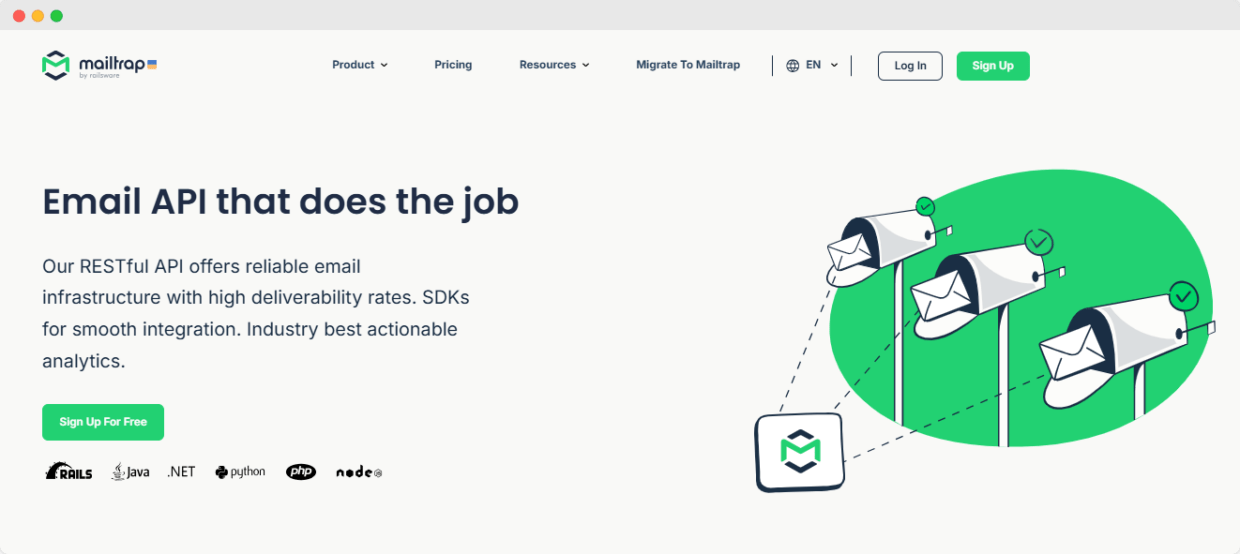
Mailtrap is an email infrastructure platform designed to streamline email testing and sending for developers. Initially known for its email testing capabilities, Mailtrap has expanded to include a secure, reliable email API for transactional and bulk emails.
The most interesting features
- SDKs for major languages. Mailtrap offers official SDKs for any popular programming language you may use, such as PHP, Python, and Ruby.
- Analytics. The tool delivers a comprehensive dashboard, granular reports, and breakdowns by email service provider.
- Bulk email sending. Mailtrap’s RESTful API supports scalable bulk email sending.
- Email logs. You can access up to 30 days of email logs, with previews in plain text, HTML, and Raw format.
Costs
Mailtrap offers two primary packages: Email Sending and Email Testing.
The Email Sending package starts with a Free tier. It’s followed by the Basic 10k plan, which costs $15 monthly for 10,000 emails. Then, there are the Business 100K, Enterprise 1,5M, and Custom plans.
The Email Testing plan also includes a free option with more advanced features in the Individual, Team, Business, Premium, and Enterprise plans.
User reviews
Mailtrap receives both positive and negative reviews on G2. Users appreciate its versatility in testing and sending emails, seamless integration, and responsive customer support.
One user praised its in-depth analytics and expanded functionality since Mailtrap’s early days as a testing tool.
However, some users mentioned the need for additional marketing features and the initial complexity of API.
Mailgun
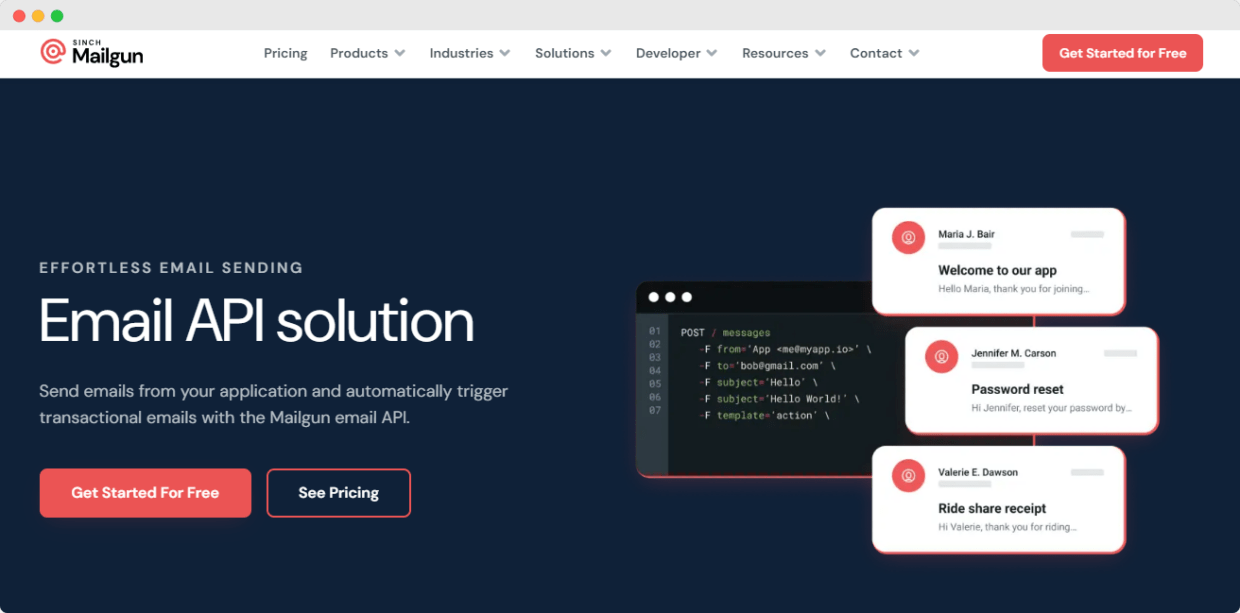
Mailgun is an email delivery platform tailored for developers who need robust email infrastructure for their applications. Its API supports transactional and bulk email sending and aims to provide efficient email solutions for businesses.
The most interesting features
- Flexible sending capacity. Mailgun’s RESTful API and SMTP relay allow for seamless email integration and support limitless email-sending capacities.
- Access management. Mailgun secures user accounts with Two-Factor Authentication (2FA), API key management, and IP-based access control.
- Bulk email support. Designed for large-scale campaigns, this bulk email API is suitable for high-volume sending.
- Analytics. Mailgun offers tracking for various email metrics, such as clicks and bounces.
Costs
Mailgun offers a flexible pricing model within two packages: Mailgun Send Pricing and Mailgun Optimize Pricing.
In Mailgun Send Pricing, the Free plan allows up to 100 emails per day and includes essential features like RESTful APIs, basic analytics, and 1-day log retention. In comparison, the Basic plan starts at $15 per month and allows 10,000 emails with no daily limit.
There is also the Foundation plan, priced at $35 per month for 50,000 emails, and the Scale plan, priced at $90 per month for 100,000 emails.
Mailgun Optimize Pricing offers three plans: Pilot, Starter, and Contract. They cost $49, $99, and a custom amount, respectively.
User reviews
Mailgun has received mixed reviews on G2.
Some users, like Romina L., appreciate its compliance with email policies and ease of managing bounces and unsubscribes. She highlights Mailgun’s ability to minimize spam folder placement.
However, users like Curtis S. have expressed concerns over Mailgun’s support, particularly regarding handling API for client-side email validations.
Mailjet
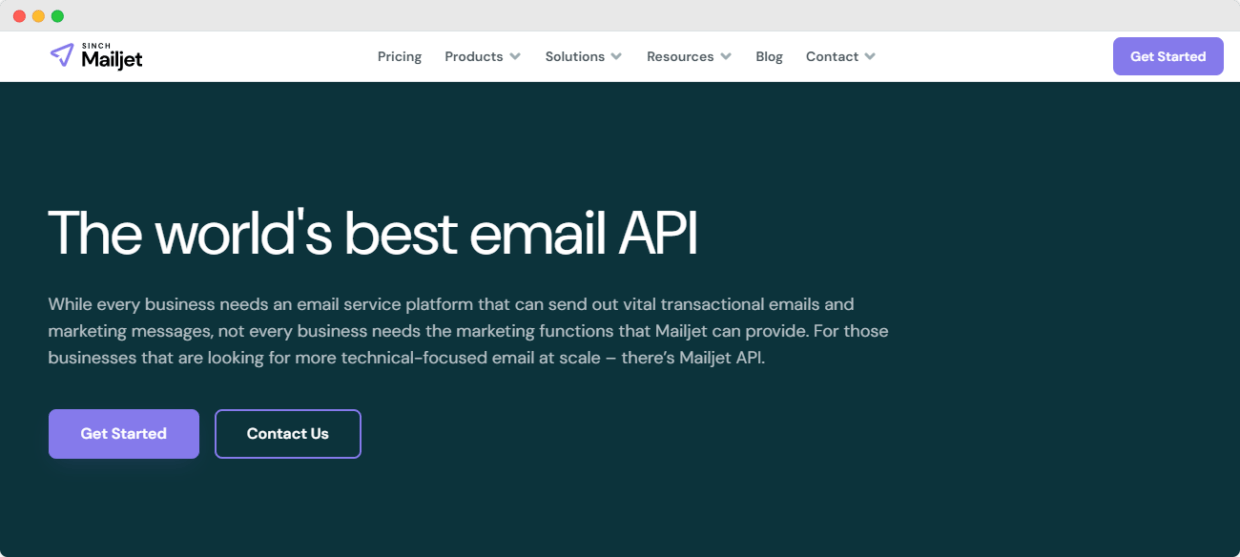
Mailjet is an email delivery and marketing platform that offers tools to send transactional emails and marketing messages. It’s particularly popular with businesses looking to integrate email functionalities at scale through its robust API.
The most interesting features
- Deliverability optimization. With dedicated IPs and sender reputation functions, the Mailjet API ensures that emails land in the inbox instead of the spam folder.
- Personalization. Customization is easy with support for Handlebars 3.0 and Golang. Businesses can create personalized email templates for subscribers.
- Reliable infrastructure. Mailjet guarantees high uptime, so you can quickly deliver emails at any scale.
- Logs and error monitoring. The Logs feature helps troubleshoot delivery issues quickly and strengthens the sender’s reputation with inbox providers.
Costs
Mailjet offers four pricing tiers, including a free one with up to 6,000 monthly emails and basic analytics.
Then there is the Essential plan, starting at $17 per month for 15,000 emails. The Premium plan starts from $27 per month for 15,000 emails, and the Custom plan has individual pricing.
User reviews
Regarding Mailjet’s API services, users appreciate the platform’s free tier and comprehensive features, such as the email editor. Many enjoy the ease of designing promotional emails.
However, some users feel that Mailjet’s free plan has limited email sending capacity compared to competitors, with a cap of 6,000 monthly emails.
Additionally, some users find the email template options lacking.
MailerSend
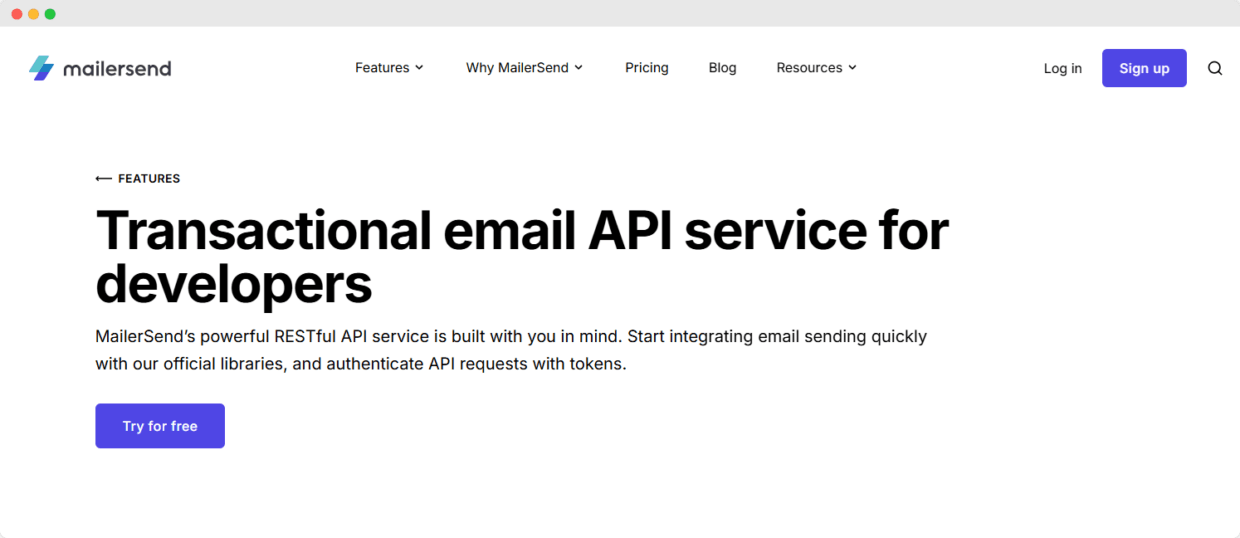
MailerSend is a transactional email API platform tailored for developers to facilitate the integration of email functionalities within applications. It’s designed with a developer-friendly RESTful API, which enables businesses to send marketing messages, order confirmations, and account alerts.
The most interesting features
- Transactional email support. MailerSend enables fast email sending for different use cases with high volumes.
- Multiple email builders. Users can choose between a drag-and-drop editor, a rich-text builder, or an HTML builder for custom-coded templates.
- Inbound routing. MailerSend supports parsing inbound emails and allows replies or interactions to flow seamlessly into your app.
- Real-time webhooks notifications. Webhooks provide instant notifications about email delivery, spam complaints, bounces, and more.
Costs
MailerSend offers four pricing plans.
The Hobby plan is free and includes 3,000 emails per month. The Starter plan costs $28 per month and includes 50,000 emails, 100 SMS, 100 email verifications, inbound routing, and API access. Additional emails cost $0.95 per 1,000.
There is also the Professional plan ($88 per month, 50,000 emails) and the Enterprise plan (custom pricing).
User reviews
User feedback on G2 varies.
There are complaints about recent policy changes that forced some customers to upgrade their plans, leading to dissatisfaction among long-term users who felt constrained by the new pricing structure.
Others have noted frustration with changes in feature availability, which impacted their ability to customize emails as freely as before.
Mailchimp
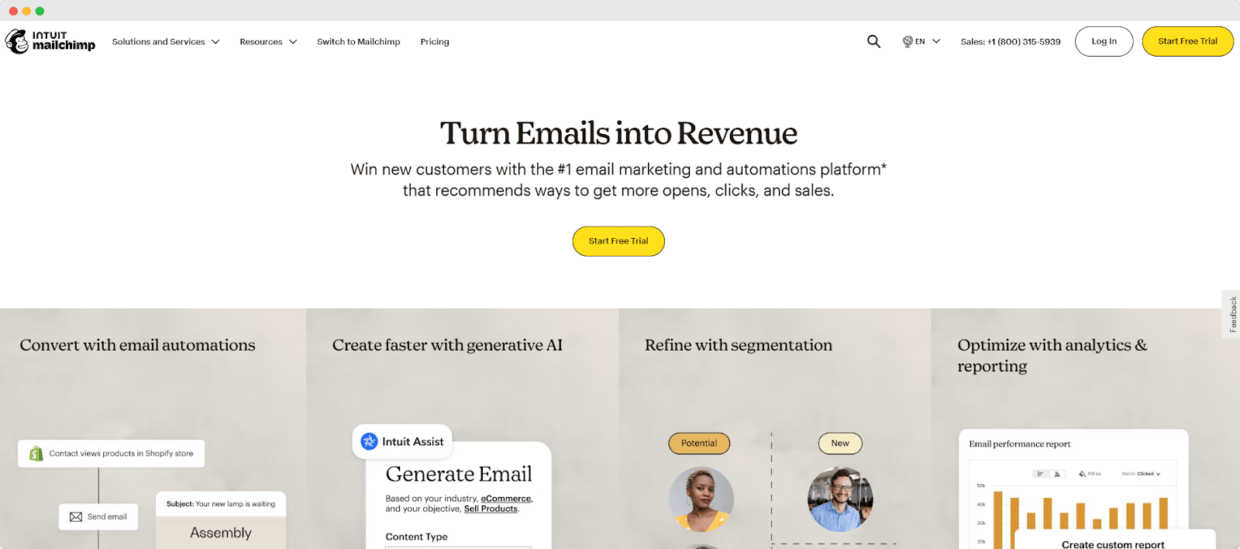
Mailchimp is a popular all-in-one marketing platform with an API service designed for marketing and transactional email needs. Its API allows developers to access Mailchimp’s functionality programmatically, for example, to manage marketing campaigns, automation, and contacts.
The most interesting features
- API for campaign management. Mailchimp’s API lets developers control and automate campaign workflows, manage subscriber lists, and set up complex email sequences triggered by user activity, dates, or specific events.
- Key security. You can generate keys for specific applications and revoke access when needed.
- Documentation. The platform delivers comprehensive documentation and necessary details for different API services.
- Support. Mailchimp support team will help configure the API and solve even serious problems.
Costs
Mailchimp offers three main pricing packages: Email Marketing, Websites, and Transactional Email.
For example, Transactional Email pricing is based on a pay-as-you-go model, with a base rate of $20 per block (25,000 emails) if you need from 1 to 20 blocks.
The more blocks you want, the cheaper price.
The pricing structure can be pretty confusing for some prospects.
User reviews
Mailchimp users on G2 generally appreciate its user-friendly interface and automation tools. This platform makes it easy to design, schedule, and track campaigns.
However, some clients highlight challenges.
Geraldine T. points out limitations on affiliate marketing and very basic features for some resources. Matt R. also mentions that Mailchimp allows you to replicate campaigns to resend again, which is not intuitive and wastes time.
Brevo

Brevo (formerly Sendinblue) is an all-in-one communication platform that supports email, SMS, and WhatsApp API services tailored for transactional messaging. Brevo’s API is built for high deliverability so companies can automate essential transactional messages.
The most interesting features
- Personalization options. You can customize email templates to include specific details, such as customer names, product details, and pricing.
- Integration support. Whether you have ten plugins or hundreds of webhooks, Brevo integrates smoothly with them.
- Extended log retention. This platform offers extended log retention to trace message history for businesses needing compliance and tracking.
- Two-way communication. Brevo’s inbound parsing feature allows emails to function as two-way exchanges, which is ideal for businesses that need customer replies or updates within systems.
Costs
Brevo offers four packages: Marketing Platform, Conversations Platform, Sales Platform, and Customer Data Platform.
For example, the Marketing Platform has four pricing plans: Free, Starter, Business, and Enterprise. The Starter plan costs $9.00 for 5,000 emails monthly.
The Business plan ($18.00/month) is designed for marketing managers and includes advanced features like A/B testing and predictive sending. The Enterprise plan (custom pricing) is tailored to large businesses.
User reviews
Feedback from G2 highlights Brevo’s effectiveness and quality of service. Users find value in Brevo’s automation tools and the flexibility to manage unlimited contacts.
However, some users mention frustrations with limited advanced features, such as detailed reporting and A/B testing, compared to other platforms. Brevo’s rebranding also came with price increases, which some users find challenging when they scale their operations.
ActiveCampaign Postmark

Postmark is a specialized API service from ActiveCampaign that focuses on delivering high-speed, reliable transactional emails. It provides tools for seamless integration, efficient email tracking, and a commitment to excellent deliverability.
The most interesting features
- API-first approach. Postmark’s APIs are core to the platform.
- Developer-friendly documentation. The documentation and API Explorer support developers with a streamlined experience for integrating and testing the API.
- Real-time analytics. Postmark offers actionable insights, from opens and clicks to more technical delivery data.
- Security. Postmark supports email authentication protocols like SPF, DKIM, and DMARC and complies with GDPR requirements.
Costs
Postmark offers simple, transparent pricing. One hundred emails are included at no cost so new users can test the platform.
Pricing starts at $15 monthly for up to 10,000 emails in pay-as-you-go rates. This plan includes all of Postmark’s features with no extra charges for access to essential tools.
User reviews
Postmark is acknowledged for its straightforward integration and high delivery reliability. One reviewer highlighted how Postmark enabled reliable transactional messaging without worrying about emails‘ poor deliverability.
However, there could be more detailed analytics and additional automation features to enhance domain health management. And multi-account/agency setup could be handled better.
Conclusion
Using an email API service is not just an option for businesses looking to scale email communications efficiently and securely.
Our top 9 picks for 2025 provide various options tailored to different needs.
Consider your priorities—be they automation, reporting, or customer support—and choose a service that aligns with your goals for the year ahead.
Ready to streamline your emails and boost engagement? The right API can be your best ally!



